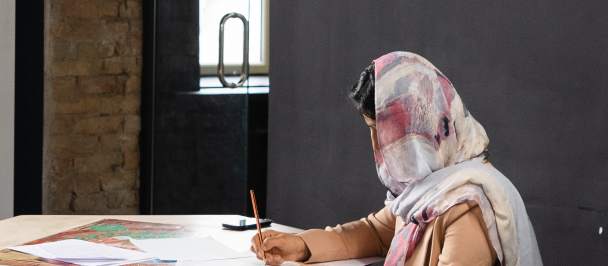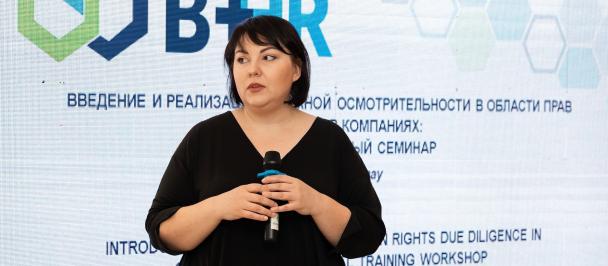Ratification of the Optional Protocol in Kazakhstan: an important step towards protecting the rights of persons with disabilities
June 14, 2023

The specialist of the Rehabilitation Centre for Persons with Disabilities in Astana interacting with an applicant
Kazakhstan is home to over 700,000 people with disabilities who face numerous barriers every day when it comes to equal access to education, health care, employment, and opportunities to develop their creative and athletic talents.
In 2015, Kazakhstan ratified the Convention on the Rights of Persons with Disabilities, which aims to create conditions for persons with disabilities to participate in society on an equal basis with others and free from discrimination. With the support of the United Nations Development Programme (UNDP), work was carried out on the development and implementation of activities under the National Plan for Ensuring the Rights and Improving the Quality of Life of Persons with Disabilities.

Assemgul Abdrakhmanova, a team member of the center
In addition, the Social Services Portal and numerous other initiatives have been developed and implemented. For example, the Rehabilitation Centre for Persons with Disabilities has been operating in Kazakhstan since 2020, providing employment assistance and follow-up support for persons with disabilities.
The National Plan for Ensuring the Rights and Improving the Quality of Life of Persons with Disabilities was an important step in ensuring equal opportunities and inclusion. Ratification of the Optional Protocol to the Convention on the Rights of Persons with Disabilities is the next important step in protecting and promoting the rights of persons with disabilities.
At the global level, the ratification of the Optional Protocol has a significant impact on the protection of the rights of persons with disabilities. Currently, 186 countries have ratified the Convention on the Rights of Persons with Disabilities, and 104 countries have ratified the Optional Protocol. This shows that the importance of protecting the rights of persons with disabilities is recognized internationally, and that countries are committed to creating inclusive societies where everyone has equal opportunities.
Optional protocols play a crucial role in promoting the progressive development of international law, strengthening the rights and protecting vulnerable groups, as well as ensuring compliance with international standards and norms in specific areas covered by the Convention.
Ratification of the Optional Protocol gives participating states the opportunity to take additional measures to protect and promote the rights provided for in the Core Convention.

Senator Lyazzat Kaltayeva and delegation from Kazakhstan participating at the Conference of States Parties to the Convention on the Rights of Persons with Disabilities, New-York, June, 2023
"Signing and ratifying the Protocol means that Kazakhstan guarantees respect for and observance of the rights of persons with disabilities in accordance with international standards. This step has significant implications for improving access of persons with disabilities to information and services in education, health care, employment, housing, transportation, and other areas. Kazakhstan is committed to adapting its legislation and policies in line with the protocol, which will promote improved protection of rights and creation of conditions for integration of persons with disabilities in the country. In addition, it also contributes to the development of new measures and mechanisms to support them,"says Lyazzat Kaltayeva, Senator in the Parliament of the Republic of Kazakhstan.
Ratification of the protocol helps Kazakhstan to be recognized internationally as a country committed to protecting the rights of persons with disabilities and complying with international standards. This should promote cooperation with other countries, exchange of best practices and experience in the field of inclusion and protection of the rights of persons with disabilities. Such cooperation can benefit the country in terms of knowledge sharing, technological development, and attracting investment in social programs and projects.
It is worth noting that at the initiative of the UNDP and the Ministry of Labor and Social Protection of the Population of the Republic of Kazakhstan, at the end of 2021, a project was launched to develop the institution of advisors to akims (local government leaders) and ministers on disability issues. Currently, akims of 13 Kazakhstan regions, 4 ministers, the head of the "Atameken" National Chamber of Entrepreneurs and some city and district akims have advisers. In 2023, for the first time in the history of Kazakhstan’s elections, more than 70 people with disabilities became members of the Parliament and maslikhats (local representative bodies).

 Locations
Locations



